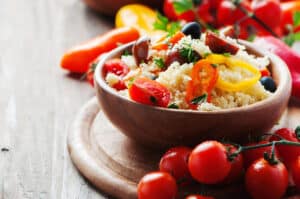 You’ve probably heard the phrase “heart healthy diet” a thousand times. As a family caregiver, perhaps you’ve recently heard it from your aging relative’s doctor who has suggested making some changes to their diet. But, what does that really mean? What should the older adult be eating and what should they avoid? Below are some tips for following a heart healthy diet.
You’ve probably heard the phrase “heart healthy diet” a thousand times. As a family caregiver, perhaps you’ve recently heard it from your aging relative’s doctor who has suggested making some changes to their diet. But, what does that really mean? What should the older adult be eating and what should they avoid? Below are some tips for following a heart healthy diet.
Eat a Variety of Foods
If your older family member tends to stick to only a few different kinds of foods, you can help them to improve their diet by encouraging them to try different foods. By eating a variety of foods, seniors are more likely to get all of the nutrients they need to stay healthy.
Choose the Right Fats
The body needs fats to stay healthy, but it’s important for your aging relative to eat more of the good ones and less of the bad ones. A heart healthy diet includes monounsaturated and polyunsaturated fats, which have been shown to improve cholesterol levels. Omega 3 fatty acids, which are found in oily fish, kale, spinach, and walnuts, are also important for better heart health. Unhealthy fats that should be limited or avoided are saturated fats, found in animal sources like full-fat dairy and meat, and trans fats, found in processed baked goods and fried food.
Eat More Fruits and Vegetables
Fruits and vegetables are an excellent source of fiber, vitamins, and minerals. They are low in calories, so they can fill up your older family without adding a lot of extra calories. By eliminating excess calories, the senior can better control their weight or lose weight if needed.
Stick to Proper Portion Sizes
Speaking of maintaining a healthy weight, the amount of food on the senior’s plate is just as important as the kinds of foods. Eating too much, even of healthy foods, can lead to weight gain and obesity, which is bad for the heart.
Eat Less Salt
Eating too much salt can cause blood pressure to rise, which contributes to heart disease. Keep track of the senior’s sodium intake and try to keep it to 2,300 mg per day or less. In fact, the ideal amount of sodium per day is just 1,500 mg.
In addition to following the tips above, family caregivers may wish to look for cookbooks that offer recipes for heart healthy meals. In fact, the American Heart Association has multiple cookbooks available. Caregivers may also wish to ask the senior’s doctor for a referral to a dietitian to learn more about the best foods to serve.
Sources
https://www.mayoclinic.org/diseases-conditions/heart-disease/in-depth/heart-healthy-diet/art-20047702
https://www.heart.org/en/healthy-living/healthy-eating/eat-smart/nutrition-basics/aha-diet-and-lifestyle-recommendations
If you are considering caregivers in Cinco Ranch, TX, for an aging loved one, please call the caring staff at At Your Side Home Care. We will answer all of your senior care questions. Call today: (832) 271-1600.
Our Certified Nurse Aides, 24-Hour Live-in Assistants and Home Health Aides are available 24 hours a day, 365 days a year. We also provide the security and confidence of 24-hour Telephone Assistance, so fast, reliable help is always available when it's needed. To learn more about our homecare services see our homecare services page.
Different people need different levels of homecare. To meet the requirements of our clients, At Your Side Homecare maintains consistent staffing levels of caring professionals. Homecare service is available for as little as a few hours a week, or as many as 24 hours a day, seven days a week
- 5 Signs a Senior Might Be in the Beginning Stages of Dementia - April 25, 2025
- What Solutions Can Help Seniors with Mental Health Challenges? - April 18, 2025
- How Does Senior Home Care Help Make Aging in Place Possible? - April 11, 2025



